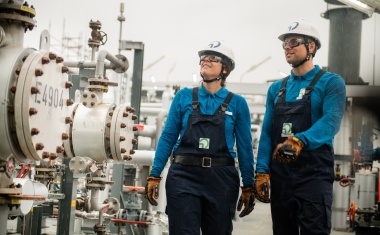
Borealis Pumps €49 Million into Circular Technologies in Germany
Borealis is investing €49 million in its Burghausen site to scale up polypropylene production and support recyclability.

Borealis is investing €49 million in its Burghausen site to scale up polypropylene production and support recyclability.


CEFIC supports the Circular Economy Act as a key measure to boost circular feedstocks and business cases, while maintaining competitiveness through coherent regulation and demand creation in Europe’s chemical industry.

Top experts from business, research and policy discuss the opportunities of recycling at the Advanced Recycling Conference 2025.

Trinseo’s complementary recycling technologies —dissolution, depolymerization, and mechanical recycling — support the development of a more circular economy by reclaiming valuable plastic waste.

Visit Röhm at K 2025 in hall 6, booth E23!

Visit Covestro at K 2025 in hall 6, booth A75 and Gallery S03

Asian conversion marks a global shift toward sustainable sourcing, enabling tire makers to adopt circular materials at scale.

How designers can help make sustainable materials both attractive and desirable, emphasizing the importance of collaboration among industry professionals to create a new aesthetic language for sustainability.

The bioeconomy offers the chemical industry new pathways to resilience and sustainability—even as economic and political priorities shift

For sustainable food packaging, Metpack is now offering coated paper and cardboard that is home compostable.

OMV has announced the expansion of its innovative ReOil technology at the Schwechat refinery near Vienna.

The versatile material polymethyl methacrylate (PMMA) is particularly impressive due to its durability and outstanding recyclability.

Plastics Europe strongly supports the European Commission's competitiveness and decarbonization agenda and welcomes the Clean Industrial Deal. It outlines important and welcome measures, including initiatives to reduce energy costs, cut red tape and create the market demand needed to incentivize investment in the circular economy.

The path to a sustainable, net-zero future for the chemical industry is paved with challenges – and also opportunities.

Today, economic success is defined by a different perception and practice of supply capability and supply security. This applies not only to the European trade with chemicals but to the entire chemical value chain.

The path to a sustainable, net-zero future for the chemical industry is paved with challenges – and also opportunities.

DNACotton is a female-led start-up from Türkiye that has developed a blockchain-based labeling and traceability system for textiles. The solution allows for reliable monitoring and analysis of materials, from fiber production to customer delivery.

Röhm Strives for Global Technology Leadership as a Methacrylate Specialist.

US green technology firm LanzaTech has signed an agreement with Sekisui Chemical to deploy, at commercial scale, a jointly developed platform that converts syngas derived from municipal solid waste (MSW) and industrial solid waste into ethanol. Sekisui intends to build multiple facilities in municipalities across Japan which incorporate equipment packages, engineering and advisory services, consumables, and intellectual property provided by LanzaTech, the companies said.

The concept of a circular economy, where materials are recycled and reused, is becoming increasingly important in consumer packaging, driven by regulatory requirements and customer interest. Modern technical advancements make it easier to think of today's goods and products as the resources of tomorrow. One such product is plastic.

Evonik announced that it is significantly expanding its commitment to developing solutions for the circular economy, bundling its activities in the group-wide Circular Economy Program. From 2030, the German specialty chemicals company aims to generate at least €1 billion in additional sales per year from circular products and technologies.

LyondellBasell has acquired a 25% stake in Cyclyx International, a joint venture between Agilyx and ExxonMobil formed in December 2020. Cyclyx is working with industry participants to develop innovative recycling solutions for all types of post-use plastics and aims at increasing the recyclability of plastics from 10% to 90%.

Austrian oil, gas and chemicals group OMV is collaborating with British engineering and consulting group Wood for the worldwide commercial licensing of OMV’s proprietary ReOil technology. The agreement follows a respective Memorandum of Understanding, that was signed between the two companies last year.

LyondellBasell has entered into a definitive agreement to acquire Mepol Group, a manufacturer of recycled, high-performing engineering compounds based in Italy and Poland.

The current crisis, exacerbated by the economic downturn and war in Ukraine, can be an opportunity to reduce dependence on fossil feedstocks and explore sustainable alternatives.

Covestro is again putting on hold its previously announced plans to build a new 500,000 t/y plant for polyurethane precursor MDI.

During this year’s K show, SABIC will highlight its commitment to circular, sustainable solutions designed to reduce plastic waste and support the shift to product electrification.

Finnish oil refiner Neste has launched a study on transforming its Porvoo facility to renewables and circular feedstocks, ending crude oil refining in the mid-2030s.

The Serbian Elixir Group has made a name for itself as one of the leading producers of mineral fertilizers and phosphoric acid in Eastern Europe.

Dorothee Arns, Director General of FECC, discusses current challenges, market trends and her vision for the chemical distribution industry in Europe. The interview was conducted by Michael Reubold and Ralf Kempf.

The Processes4Planet (P4Planet) partnership’s goal is to transform the European process industries to make them circular and achieve overall climate neutrality at EU level by 2050, while enhancing their global competitiveness.

With an eye toward the growing electric vehicle market, BASF has announced it will build a battery recycling prototype plant at the site of its cathode active materials (CAM) production facility in Schwarzheide, Germany.

The EU Commission’s ambitious plan for a European Green Deal, launched shortly before the pandemic struck in early 2020, aims to make the continent the world’s first climate-neutral region by 2050. The goals spelled out in January last year call for reduction of greenhouse gas emissions by at least 50% up to 2030, compared with 1990 levels.

Spanish energy group Repsol is joining the Ecoplanta project that will build a waste-to-chemicals plant in Tarragona.



















